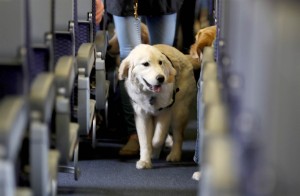You have likely heard some of the many stories recently, in the news, of people attempting to bring non-tradional support animals onto airline flights. Some have been denied access, such as the peacock. But there are far more examples of flights with pets claiming to be “emotional support animals” or ESA’s reported, along with the problems caused during those flights. Most recently, there was the case of the alleged support hamster, whose owner claims was first told she could board the pet, and then was later told to flush him/her down the toilet in order to board her flight. Or so, her lawyer claims.
This brings to light a problematic trend of people attempting to travel with non-certified pets in the passenger section of airplanes, and how easy it is to acquire false documentation that the pet is ESA , and that the client has a psychological need to travel with that pet. People are motivated for many reasons to do so, including avoiding travel fees for pets, and avoiding them being sent to the cargo area.
Sadly, though, the abuse of the system is making it more difficult for true certified pets, and their legitimately emotionally in need of support owners, to travel. The good news is that the recent rash has prompted a crack down by the airlines, and agencies who monitor this behavior. How, you may ask, is it happening, and how prevalent is the problem?
The reality is that more than 2300 complaints involving “service animals” were filed between 2012 and 2016. Delta alone flew 250,000 animals in the “emotional support” category last year, an increase of 150 percent from 2015. Incidents such as biting and defecating nearly doubled since 2016. Cases of cats urinating on seats, dogs blocking beverage carts and ducks wandering the aisles all made it harder to manage flights. Flight attendants for Delta have been bitten and even asked to administer oxygen to a dog that, according to its owner, was having anxiety mid-flight. Delta, United, and American Airlines, in addition to disability rights advocates, have led the movement to end fliers fraudulently manipulating federal law to bring untrained pets of varied species into the crowded, already stress filled cabins, making a recipe for potential disaster.
The Americans with Disabilities Act defines service animals as “trained dogs or miniature horses”. Yet, airlines are bound to the more liberal Air Carrier Access Act of 1986, allowing free travel for “any animal that is trained to assist a person with a disability or that provides emotional support.” Need for emotional support must be provided with documentation from a physician or mental-health professional. The problem is that those letters are easily forged and obtainable. What you may want to consider is that, if your pet bites someone, letter or not, you are legally responsible for the repercussions.
Slowly, though, scrutiny is sharpening. Nineteen states now have laws that criminalize passing off pets as service animals.
People with allergies to pet dander, who are also protected under federal disability laws, often feel their concerns are overlooked compared to fliers with ESAs. Most people are sympathetic to the real needs of those with support animals. But, everyone else on an airplane should be afforded the peace of mind that the animals on flights are properly trained to go handle these situations. The abuse of the system has led to doubts and the heightened scrutiny has ended up endangering some true ESA animals. Pets accompanying fliers near working ESA dogs make the working dog’s job harder than it needs to be.
Unfortunately, aligning airlines policies with the American Disabilities Association’s concerns and policies has not gone smoothly. Disability advocates disagree, for instance, on the definition of a support animal. Some want to restrict the category to dogs and cats, while others want to allow rabbits and household birds.
Some service-animal organizations want there to be recognition of “Psychiatric service-animals”, which are typically dogs, who can be trained to performs tasks such as turning on lights for PTSD sufferers, not to be required to provide a medical letter. The National Alliance on Mental Illness wants requirements to apply to both service and support animals, without creating undue burdens on travel for those with disabilities. And, the cost associated with obtaining professional documentation, is seen as an extra hardship.
Clearly, the lack of agreement of all the parties involved in the talks expose that it is a complicated problem to solve, but, the disagreements will only further delay a solution.
The good news is that some airlines are independently doing what they can, in the meantime, to make it more difficult for fliers to abuse the system Delta, as of March 1, is requiring passengers with trained service animals to submit a veterinary health form at lease 48 hours prior to travel, to the airline’s new Service Animal Support Desk. Customers with ESA’s or psychiatric service animals must do the same, and also provide a letter from a doctor or mental-health professional, in addition to a signed document stating the animal is trained to behave in public. They also expanded their list of prohibited species, including farm poultry, hedgehogs, and anything with tusks. Additionally they may exclude animals that are too large or heavy to accommodate the flight cabin, pose a threat to the health of safety of others, or could cause a significant disruption of service. Animals prohibited from entering a foreign country are also denied boarding. And, airlines are also never required to accept snakes, reptiles, rodents, ferrets, or spiders.
There was an enlightening article written by a veterinarian, Dr. Phyllis DeGioia, last winter, in which she elaborated how she easily, yet fraudulently, she acquired documentation to claim her dog as an ESA. In it, she explained how a psychologist, for a fee, provided her with a letter claiming she had PTSD (Post Traumatic Stress Disorder) and needed her animal for support while flying. That diagnosis was made by a psychologist in NY, while she lived in Wisconsin, whom she located through a quick online search of doctors. She specifically contacted “ESA Doctors”. They offer a choice of three packages: one for flying only, one for housing only, and one for both. Apparently, it is legal for a psychologist in one state to provide services for a patient in another state. At least, for now. Dr. DeGioia goes into detail how, by the thinnest of nearly imaginary margins, she rifled through her childhood memories to come up with something “traumatic”, which qualified her for her PTSD diagnosis, and the paperwork to prove it… for life.
She refers to a great expose piece aired on the Today show, demonstrating how easy it can be to pull off this fraud. Refer to it at:
http://www.today.com/pets/emotional-support-animals-are-making-flying-beastly-experts-say-t70756. Or google it using that phrase. Appalling.
 Also, there are several ways to obtain “fake” service dog vests, papers, and ID’s. The list below contains red flag organizations that the airlines should be suspicious of, requiring a purchaser to simply fill out a form, and mail it, including payment. The costs range from $35-200.
Also, there are several ways to obtain “fake” service dog vests, papers, and ID’s. The list below contains red flag organizations that the airlines should be suspicious of, requiring a purchaser to simply fill out a form, and mail it, including payment. The costs range from $35-200.
-SARA (Service Animal Registry of America)
-USARplus (United Service Animal Registry)
-Goldstar German Shepherds
-SDA (Service Dogs America)
-Registered Service Dog
-SDCA (Service Dog Certification of America, aka Certify My Dog)
-NSAR(National Service Animal Registry)
-American Service Dogs
-Service Dog ID
-Certified Service Dog
-National Association of Service Dogs
-Service Dog Tags, aka emotionalsupporanimals.org
-Free My Paws (they lead you to believe that you need to renew the ID cards yearly, for a fee)
-CRTASA (Canadian Registry of Therapy Animals and Service Animals)
-USSDR (United States Service Dog Registry) (registration free, but sell ID tags)
-registermyserviceanimal
-Official Service Dog Registry
-Service Dog Kits
I hope that the regulations can be streamlined, adopted universally, and enforced, sooner rather than later. I feel that people with real disabilities, both physical and emotional, should be able to travel with support animals, properly trained, and protected from situations making their travel more difficult. I believe that the more people understand the implications of fraud, hopefully the less likely they will be to consider it, making airline travel as safe and smooth as it can be for all of us.
As I often tell my children: “Just because you can, doesn’t mean you should”.
Dr. Dawn
Please share and subscribe here






